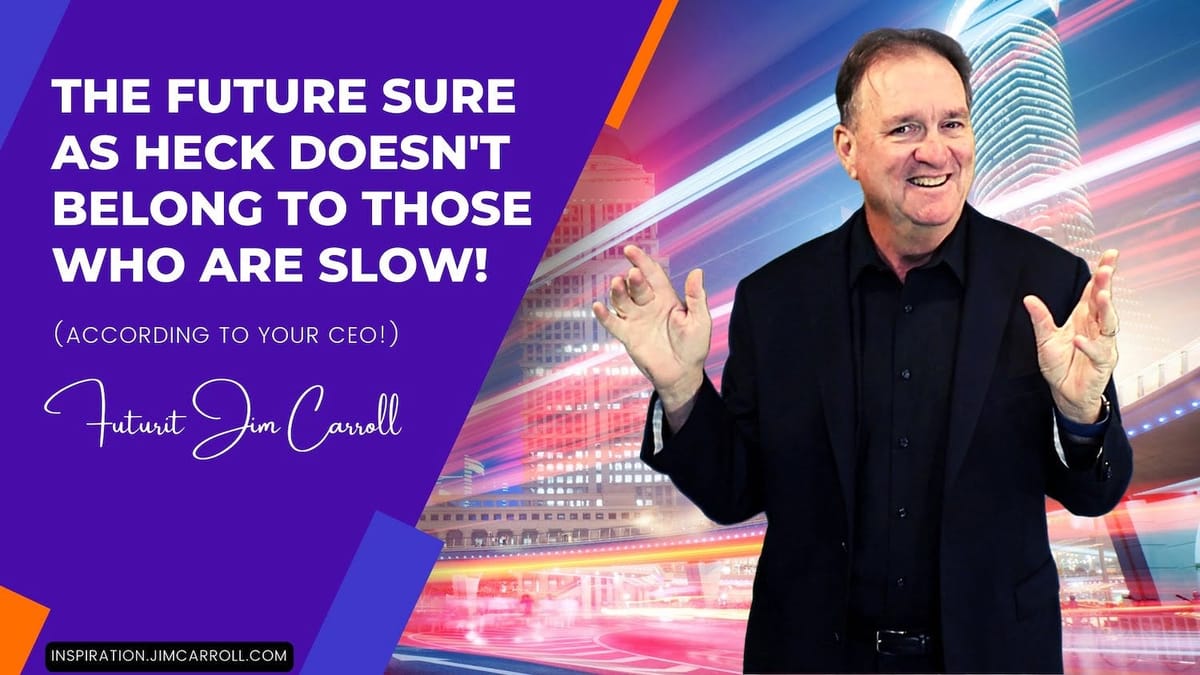The CEOs aren't happy - because they don't see any compelling sense of urgency with their team.
That's the message from recent surveys from recruiting firms Russell Reynolds and Price Waterhouse. Bottom line? CEOs don't believe that their leadership teams and staff are moving at the speed necessary to deal with a faster future.
It's kind of ironic for me to see this type of survey result because my book from 2012 hammered home that theme. Partially based on what I was seeing my CEO clients suggesting to me in our calls prior to an advent, "The Future Belongs to Those Who Are Fast" outlined why leadership speed would be crucial to future success.

This is what I wrote in the intro to that book:
I have a pretty unique job. I spend a lot of my time challenging people to think about innovation and the future, whether it is for a conference of 1000’s or a small CEO/Board meeting of 10-15 people.
In preparing for these events, I have the opportunity to talk to a lot of different people about the trends impacting their organizations. I also do an extensive amount of research that helps me to understand the future that they face.
What I have learned over time, regardless of the industry or group, is that the pace of change that we have seen in the last few years is not going to slow down - the future does truly belong to those who are fast.
The future doesn’t belong to those who have owned a market place because of their history. Past success doesn’t guarantee a future of winning. Resting on ones laurels is perhaps the best method to place yourself at the greatest risk in the future.
We live in a world in which business models evolve at a furious pace. In which customers are demanding and expecting new forms of interaction. In which technology and mobile devices are changing industries at a furious pace. Everywhere you look, you witness rates of change and innovation which are accelerating, not slowing down.
That leads to an undeniable fact - it will be the ability of an individual, a leader, and an organization to keep up with fast paced change that will increasingly define their potential for future success.
With that in mind, consider the results of the surveys, from the article "Global CEOs losing confidence in their leadership teams - survey", 20 January 2023, Reuters News.
Chief executives of global corporations are losing confidence in their leadership teams' ability to tackle issues like digital technology, climate change and diversity, according to a new survey by the search firm Russell Reynolds Associates on Friday.
Chief executives are much less confident than they were 18 months ago in their top leadership’s abilities to embrace change and model the kind of behaviours and culture they want in the organization, according to the Leadership Confidence Index.
Confidence in leadership teams is also falling among other C-suite executives and those who report to them, it showed.
"The gap between talk and real impact on issues like digital, ESG, DE&I and succession planning is becoming increasingly clear for many organizations,” the survey said, referring to environment, social and governance (ESG) and diversity, equity and inclusion (DE&I).
The findings, based on online responses from nearly 1,700 CEOs, senior executives and non-executive board directors in 46 countries, underscore how the fatigue of managing through the pandemic, years of disruption and a challenging geopolitical and macroeconomic environment is taking a toll on executives.
It comes after a PricewaterhouseCoopers survey showed nearly 40% of CEOs thought their companies would not be economically viable over the next decade unless they innovated and transformed at a faster pace.
Taken together, the findings could mean companies are forced to re-evaluate whether they have the right sets of skills on their leadership teams and invest in developing talent.
"It is reasonable to expect that many leadership teams will see changes," said Tom Handcock, managing director of Russell Reynolds’ Center for Leadership Insights. "They will bring in new people that have different experience and fresh ideas."
This is consistent with everything I have been seeing out there for years - and the one issue that keeps coming up for the engagements I am booked for often has to do with digital transformation. CEOs know that the business models and distribution networks are changing, customer relationships and interactions are far more demanding, the competition is accelerating, and products and services can go out of date faster - and that technology is at the heart of much of this change, and that 'digital transformation' is o longer an option.
I will often take on this issue with the audience using a series of live text message polls that I run throughout my talk. Here's a variety of results from real events, randomly selected, that put into perspective the issue that I emphasize. First. I'll ask the room if they think they are ready for a faster future. For the last 15 years, for almost every single event I have keynoted, the answer has been, pretty much: "NO."
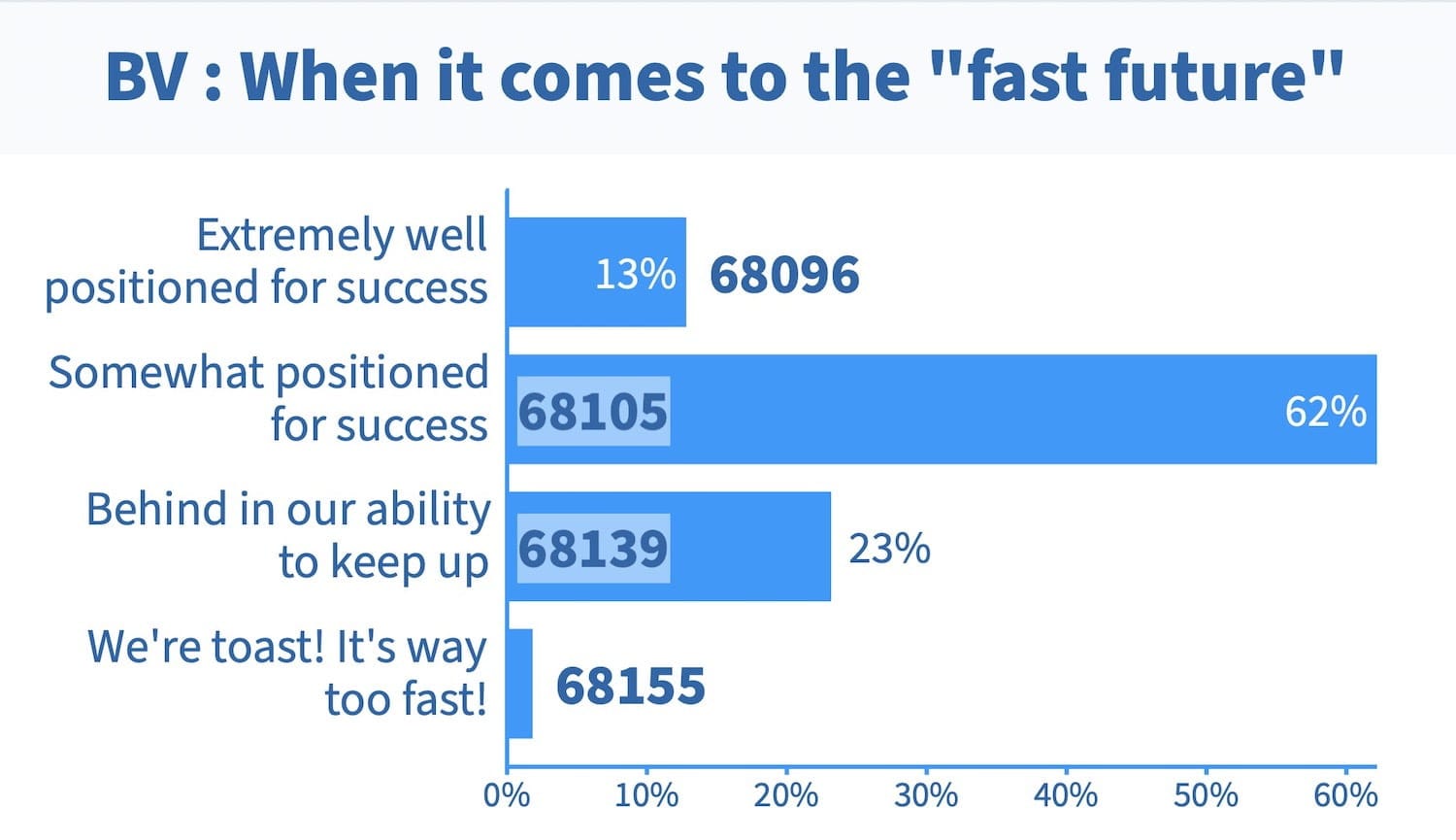
Then I ask if they think that a lot of change is coming their way. The answer - consistently - is an overwhelming "YES."
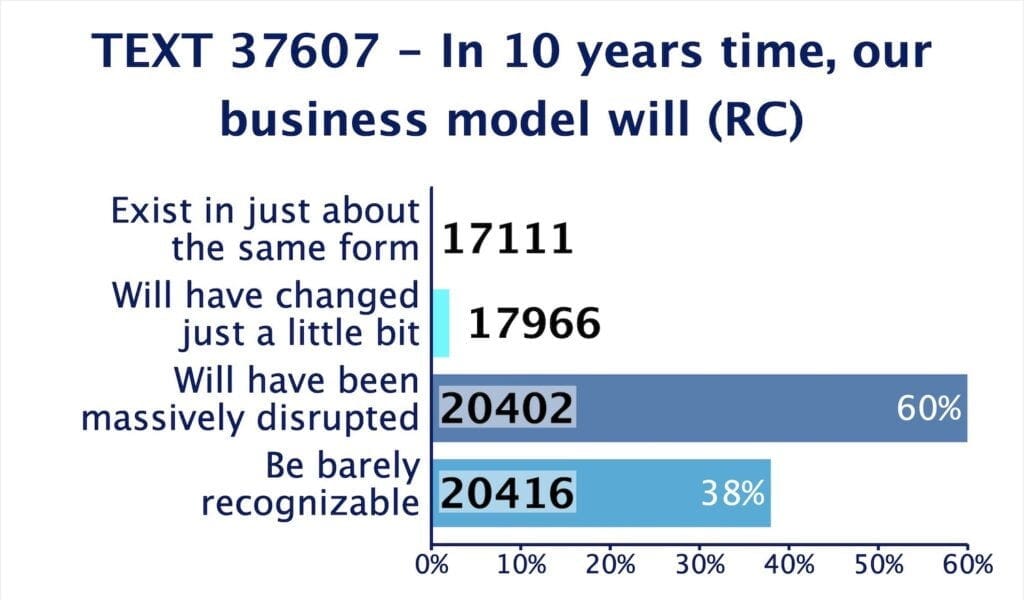
The next question? Do they think they can innovate 'at speed?' Virtually every single audience has answered - "NO."
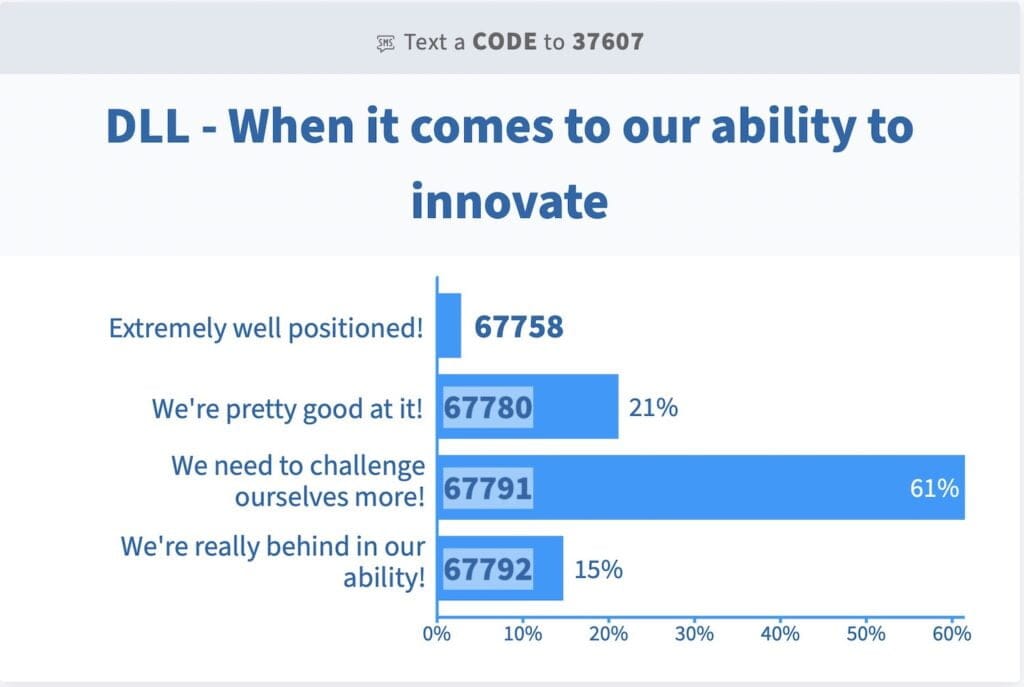
I then ask - Why not? The answers are consistent.
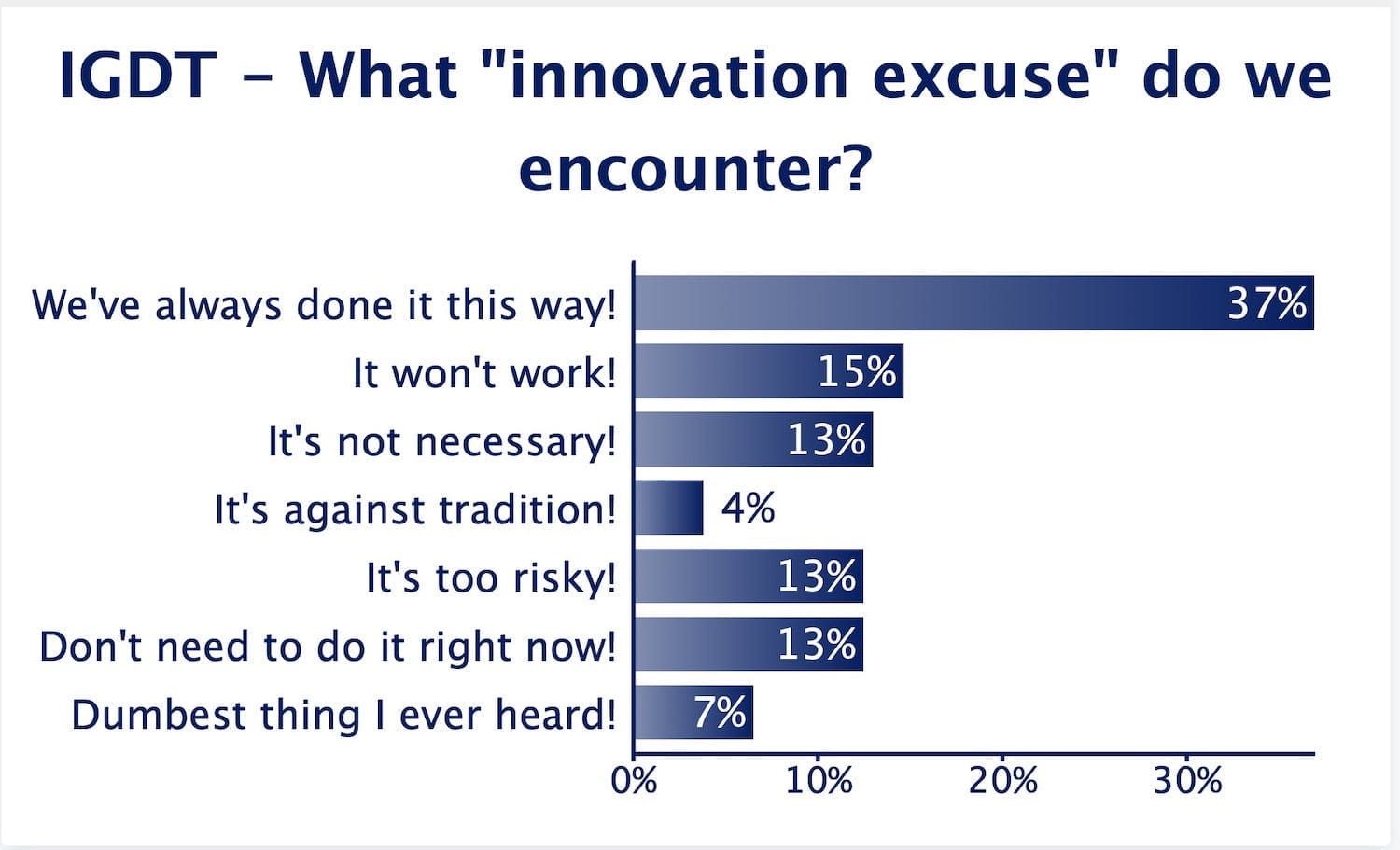
No wonder the CEOs are frustrated. In the fifteen years that I have been doing these pools from the sage, the answers have remained overwhelmingly consistent - we know our future is changing, and the change is going to be pretty big. Yet, we know we aren't ready and have a whole bunch of excuses in the way of our potential for success.
How do you fix this disconnect? Focus on leadership speed! With that in mind, it's a good time to replay what I've written in the past about how organizations might solve this disconnect - by establishing the position of a Chief Momentum Officer. Here's my original post around that issue (which I have used in my Daily Inspiration before, but I think is worth repeating.)
I’m now observing that in many markets and industries, the pace of change is so fast that we need to put in place a senior executive whose sole area of responsibility is ensuring that the organization can keep up with ever-increasing rates of change.
Organizations need to adapt to all kinds of different issues when it comes to the velocity of change: rapidly changing business models, the emergence of new competitors, ever-shrinking product lifecycles, a faster pace of new product development, furious rates of technological innovation, furiously fast new trends in terms of customer interaction, the decreasing shelf-life of knowledge and the more rapid emergence of specialized skills: the list could go on!
Hence, the likely emergence of the new position of “Chief Momentum Officer.”
This individual will carry a number of responsibilities, such as:
- managing the product innovation pipeline, so that the organization has a constant supply of new, innovative products, as existing products become obsolete, marginalized, or unprofitable
- managing the talent pipeline, so that the organization has the ability to quickly ingest all kinds of specialized new skills
- managing the technology pipeline, so that the organization can adapt itself to constantly improving and ever-more sophisticated IT tools that will help to better manage, run, grow, and transform the business
- maintain and continually enhance brand and corporate image; as I’ve written here many times before, brands can become “tired” and irrelevant if they aren’t continually freshened and refreshed
- ensuring that the organization is continuing to explore new areas for opportunity and that it has the right degrees of innovation momentum
- that the business processes and structure of the organization are fine-tuned on a continuous basis so that it can keep up with all the fast change swirling around it
- ensuring that a sufficient number of “experiential” programs are underway with respect to product, branding, markets, and other areas so that the overall expertise level of the organization is continually enhanced
In other words, the CMO has two key responsibilities:
- keeping a fine-tuned eye on the trends which will impact the organization in the future, and which will serve to increase the velocity that the organization is subjected to and;
- keeping their hands on the appropriate levers throughout the organization such that it can keep evolving at the pace that these future trends will demand.
I don’t know if that makes perfect sense, but I think it's a good issue to think about.
Jim Carroll has been preaching on the need for speed for more than two decades. With books like Ready, Set, Done: How to Innovate When Faster is the New Fast; The Future Belongs to Those Who Are Fast; and Think Big, Start Small, Scale Fast, he seems to have a bit of a theme to his work. It's interesting to see that many CEOs are now echoing this theme.

